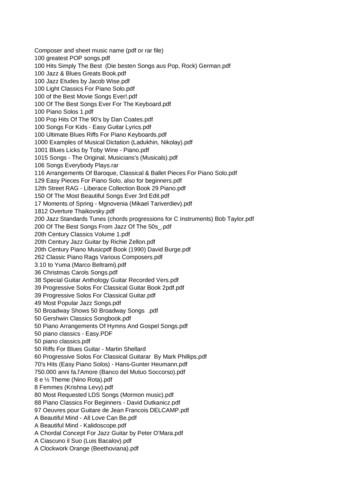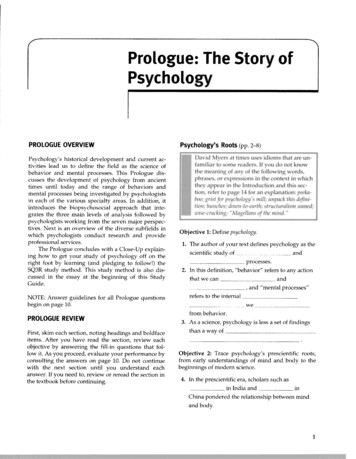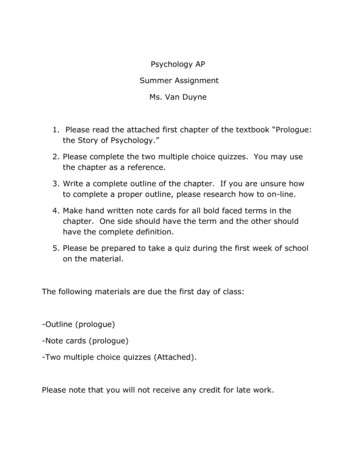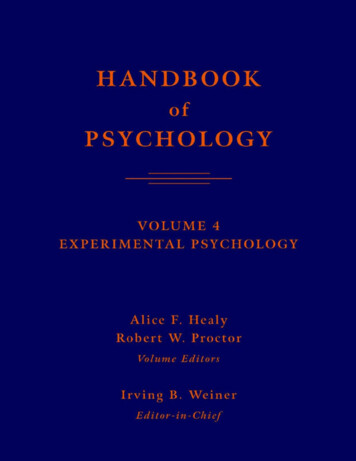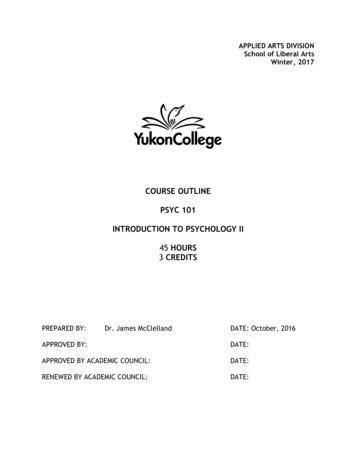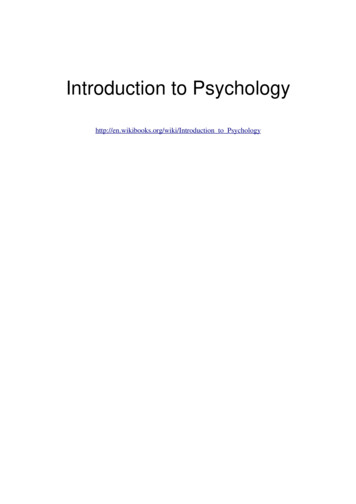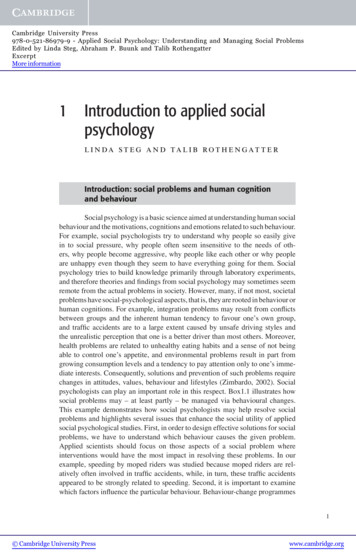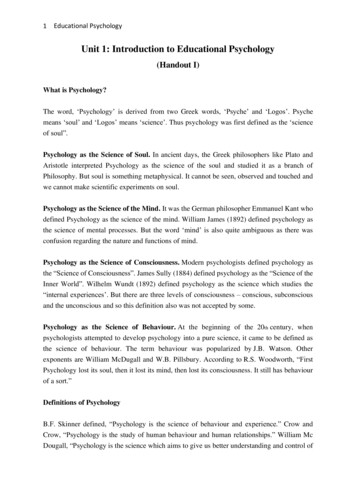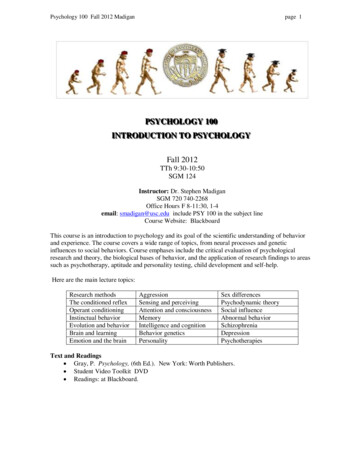
Transcription
Psychology 100 Fall 2012 Madiganpage 1PPSSYYCCHHOOLLOOGGYY 110000IINNTTRROODDUUCCTTIIOONNTTOO PPSSYYCCHHOOLLOOGGYYFall 2012TTh 9:30-10:50SGM 124Instructor: Dr. Stephen MadiganSGM 720 740-2268Office Hours F 8-11:30, 1-4email: smadigan@usc.edu include PSY 100 in the subject lineCourse Website: BlackboardThis course is an introduction to psychology and its goal of the scientific understanding of behaviorand experience. The course covers a wide range of topics, from neural processes and geneticinfluences to social behaviors. Course emphases include the critical evaluation of psychologicalresearch and theory, the biological bases of behavior, and the application of research findings to areassuch as psychotherapy, aptitude and personality testing, child development and self-help.Here are the main lecture topics:Research methodsThe conditioned reflexOperant conditioningInstinctual behaviorEvolution and behaviorBrain and learningEmotion and the brainAggressionSensing and perceivingAttention and consciousnessMemoryIntelligence and cognitionBehavior geneticsPersonalitySex differencesPsychodynamic theorySocial influenceAbnormal behaviorSchizophreniaDepressionPsychotherapiesText and Readings Gray, P. Psychology, (6th Ed.). New York: Worth Publishers. Student Video Toolkit DVD Readings: at Blackboard.
Psychology 100 Fall 2012 Madiganpage 2Course Requirements and Grading1. Three tests, 100 points each.2. Final examination, cumulative .3. Two papers@ 40 points each .30012080500 totalTest Dates: Thurs. Sept. 20, Thurs, Oct. 18, Thurs. Nov. 15. Final: Thurs Dec 13 11-1.Test format: multiple choice and short-answer questions. The final exam will have a take-homeessay question. Each test will cover the material from the immediately preceding set of topics(see Lecture Schedule) and will be based on the text, videos, lectures, and discussion sections.There will be a review guide distributed for each test, and a review session prior to each test. For all tests you must bring a pencil and a Scantron form (Accuscan #29240), or be ready for afast hike to the bookstore and back. You cannot take a test if you arrive after 9:45.Makeup tests: Allowed for verified health reasons or pre-approved University activities only.Makeup tests (short answer and essay questions) will be given in SGM 501 at 8 a.m. on theFriday following each scheduled test—no exceptions. You cannot take more than one such test.Grading. Grading is based on your three test scores, final exam, papers, plus bonus pointspoints%A45090A42585B 40080B37575B35070C 32565C30060C27555D 25050D22545D20040F 200 40The percentages are the approximate cutoffs. Borderline grades (within 1% of the cutoff) willnormally be raised to the next higher grade level. Discussion section attendance records will influencethis decision.Discussion Sections. These are an important part of the course. They will involve presentation anddiscussion of new material, discussion of writing assignments, and bonus point activities.
Psychology 100 Fall 2012 Madiganpage 3WRITING ASSIGNMENTSThe two writing assignments for this class will require you to describe and analyze different kinds ofbehavior and psychological experience in terms of the theories and concepts presented in lectures andreadings. Specific instructions, guidelines, and requirements will be discussed at the time the papersare assigned in discussion section meetings. Grades will reflect the accuracy and thoroughness of youranalysis, the originality of your examples, the clarity of the presentation, and the quality of yourwriting.Get a draft of your paper done early bring it to office hours for a review – pretty much guaranteed toimprove your grade. Must be done in person – no electronic submissions.Note the following general requirements and suggestions:1. Papers should be typed and double-spaced. Keep a backup copy. Include your TA's name and yoursection on the title page.2. Familiarize yourself with the standards and practices for quoting and paraphrasing sources.3. Use the American Psychological Association format for references and reference lists. But it’s soeasy: Just look at the way the textbook does it.4. See the sample papers available at Blackboard.5. Paper length: 7-8 pages. (But we don’t weight them, we read them)Papers must be handed in at lecture only, 9:20 on the date indicated. Late penalties will be applied:10 points per day or any part thereof.Paper #1 Conditioning as you’ve experienced it Analyze your own experiences in terms ofPavlovian and operant conditioning (40 points). Due: Tues, Sept. 18 at lecture 9:30.Paper #2 Personality assessment. Fill out a personality assessment questionnaire and discuss yourscores in terms of your actual behavior and principles of psychological testing (40 points).Due: Tues. Nov. 13 at lecture 9:30.This course adheres to the principles and policies as presented in this document:USC Integrity ms/tio.pdf
Psychology 100 Fall 2012 Madiganpage 4COURSE CREDIT FOR RESEARCH ACTIVITIESThere are three opportunities to earn up to 40 bonus points. Note that these are true bonuspoints in that they are added to your point total from tests and papers (the numerator) butaren’t part of the denominator. 15 points cognitive testing: Four kinds of tests will occur at discussion sectionmeetings on the indicated dates. Note: You must take all tests to get this credit. 5 points Survey Questionnaires: filling out a set of questionnaire material on theInternet. 20 points Research Participation: participating in research conducted by membersof the Psychology Department --up to 10 hours of participation, 2 points per hour.This starts August 27 and continues until Dec. 3How to sign up for research using The Experiment Management System: See thePowerPoint instructions at BlackBoard in \Contents\Researh Participation. We urge you to participate in all of these activities. They are important for theresearch and teaching functions of the Psychology Department, they will give youfirst-hand experience with psychological research and testing, and they can addsignificantly to your point total.You may substitute a book review for research activity if you prefer. See me toarrange this.JEP participation: You may substitute JEP (Joint Educational Project) participation for theResearch Participation activity. Information about JEP will be distributed at lecture.Learning & Study ResourcesLecture Notes: PowerPoints will be posted at Blackboard prior to each lecture.Sample tests: available at BlackBoard. These are test questions from previous semesters that willgive you an accurate idea of the general style and difficulty level of the material as tested.Publisher’s Website: This free site provides quizzes and demonstrations for each chapter of the text.http://bcs.worthpublishers.com/gray. Pages xxiv-xxvii of the text describe many other resourceswhich may or may not be worth the money.
Psychology 100 Fall 2012 Madiganpage 5How I Study for Psychology 100This description of study habits and practices was written by a USC student, Timothy Fellows.They worked for him (A ). What he does is exactly what modern theories of learning andremembering say should be done.A) Reading1. I always do the reading prior to a lecture.2. I underline and highlight important points as I go along.3. I will re-read a section until I understand it.4. I have a ―reading notebook‖ into which I copy all bolded terms and their definitions.5. I try to anticipate test questions, based on the style of previous questions and their answersTime: 1-2 hours per reading assignment, depending on reading.B) Lecture1. I don’t miss lectures.2. I like to sit up front, where I will be less distracted and more likely to hear.3. I take notes furiously directly on the lecture slide print-out, adding all extraInformation the professor gives.4. I answer rhetorical questions during lecture in my head to test my retention of thereading.Time: 1 ½ hours, twice a weekC) Post-Lecture1. I type all information from the lecture, both previously on the notes and added, into anorganized lecture-outline. [Note: I don’t recommend doing this – sm]2. If material is extremely detailed and/or important, from lecture or reading (such as thestructures of the brain and their roles and locations), I write out the necessaryinformation in big letters on printer paper in an organized and logical manner.I post this above my bed, and test myself every once and a while.Time: 1 hour following every lectureD) Studying1. If I have faithfully done the above, I find I don’t have to study much for a test.2. I look over study guides, find terms I can’t recall or don’t know, and re-learn thoseterms.3. I take a practice test as if it were a real test, by saving it to my computer fromBlackboard and unbolding the answers. Then I take the test in one sitting andcheck my answers afterwards. I discover what concepts I don’t know, and studythose concepts. However, I find that how well I do on the pretest remains a goodindicator of how well I will do on the real test.4. I glance over the book and notes, paying special attention to charts and graphs.5. I print out my typed lecture outlines and review them, highlighting especiallyimportant points.Time: 3-4 hours, spread out over a few days.In general: I try to repeat thinking about the subject matter as much as possible. I amalso generally interested in psychology and its topics, which I believe motivates me to learn.
Psychology 100 Fall 2012 Madiganpage 6LECTURE SCHEDULE FALL 2012 Part 1DateAug. 28Course OverviewReadingsCh. 1, Preface xviii-xvxixAug. 30Psychological Science: Research MethodsCh. 2Sept. 4The Conditioned ReflexCh. 4 93-107Sept. 6Reward Learning & Operant ConditioningCh. 4 107-119Sept. 11Instinct & Evolution - 1Sept. 13Instinct & Evolution - 2Ch. 3 63-91 Ch. 4 119-135Ch. 11 426-428STVK:3-1, 3-2Ch. 3 61-91Sept. 18ReviewPaper #1 due at lectureTest #1Sept. 20TopicVideos: See the BlackBoard posting for Part 1DISCUSSION SECTION MEETINGS Part 1Except for the week of Sept 17-21 there are no discussion section meetings during test weeks. TAswill be available during office hours and their section meeting times.WeekActivitiesAug. 27-31No discussion section meetings this weekSept. 3-7 *Sept. 10-14Paper#1 assigned and discussed.Cognitive testing #1 bonus pointsEvolution and behavior: Mate selectionSept. 17-21Cognitive testing #2 bonus pointsReadingsCh. 4Ch. 3, Buss reading* Monday Sept. 3 (Labor Day) Discussion section: Go to any other section’s meeting thisweek or come to Friday office hours.
Psychology 100 Fall 2012 Madiganpage 7LECTURE SCHEDULE Part 2DateTopicReadingsSept. 25Brain and LearningCh. 5Sept. 27Motivation: The BasicsCh. 6 185-208; Ch. 7 239-244Oct. 2Emotion and AggressionOct. 4Sensation and PerceptionOct. 9Attention and ConsciousnessCh. 2 84-86; Ch. 6 220-229; Ch. 13 479-482 Ch.14 541-545STVK:6-5,6-6,6-7,4-4 Ch. 8 269-272 286-292Ch.7 231-236246-251292-306.Ch.STVK:8-1, 8-2, 8-39 309-320Oct. 11MemoryCh. 9 321-348 Ch. 11 412-413Oct. 16ReviewOct. 18Test #2Videos: See the BlackBoard posting for Part 2DISCUSSION SECTION MEETINGS Part 2Sept. 24-28Cognitive Testing #2 bonus pointsOct. 1-5Personality measurement (required for Paper #2)Ch. 15Oct. 8-12False memoryCh. 9 337-341Oct. 15-19Cognitive Testing #4 bonus points
Psychology 100 Fall 2012 Madiganpage 8LECTURE SCHEDULE Part 3DateTopicReadingsOct. 23Behavior geneticsCh. 2 51-63, Bouchard readingOct. 25PersonalityOct. 30Psychodynamics and FreudNov. 1Intelligence and cognitive developmentCh. 15 549-566 580-590Ch. 12 447-450 Ch. 2 p. 43Ch. 15 570-576 Ch. 5 168-169Ch. 17 650-656 Ch. 13 494-498Ch. 10 374-395 354-355Nov. 6Intelligence continuedCh. 11 397-414Nov. 8Sex and gender differencesCh. 3 84-86 Ch. 7 238-241Ch. 12 453-456 Ch. 15 566-570Nov. 13ReviewPaper #2 due at lecture 9:30Test #3Nov. 15Videos: See the BlackBoard posting for Part 3DISCUSSION SECTION MEETINGS Part 3Oct. 22-26Paper #2 assigned and discussedCh. 15Oct. 29-Nov. 2The Flynn EffectDerbyshire readingNov. 5-Nov. 9No discussion sections this weekNov. 12-16Test week-no discussionmeetings this week.
Psychology 100 Fall 2012 Madiganpage 9LECTURE SCHEDULE Part 4DateTopicReadingsNov. 20Social influence and social cognitionCh. 13 475-483, 499-508Ch. 14 511-532 541-548Nov. 22ThanksgivingNov. 27Abnormal behaviorNov. 29SchizophreniaCh. 16 593-606 Ch. 417-428 Ch.11 417-418Anorexiareading 625-635Ch.16 606-612Dec. 4Mood Disorders & Anxiety DisordersCh. 16 606-612 613-625Dec. 6PsychotherapiesCh. 17Dec 13Final exam 11-1Videos: See the BlackBoard posting for Part 4DISCUSSION SECTION MEETINGS Part 4Week ofTopicReadingsNov 19-23Case study: Anorexia nervosaAnorexia readingNov 26-30Diagnosis and assessmentCh. 9 337- 341Dec. 3-7Effective self-helpReading
Psychology 100 Fall 2012 Madigan page 1 PPSSSYYCCHHH OOOLLLOOGGGYYY 11000000 . the biological bases of behavior, and the application of research findings to areas . Just look at the way the textbook does it. 4. See the sample pape
